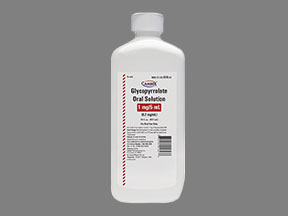
Cuvposa Coupons & Savings Card – Discount Prices from $69.34
Brand for: Glycopyrrolate
My prescription
Edit
473ML of 1MG/5ML, Glycopyrrolate (1 Bottle)
Select pharmacy

CVS
$69.34
COUPON PRICE
Albertsons
$132.82
COUPON PRICE
Walgreens
$146.79
COUPON PRICE
Walmart
$243.19
COUPON PRICECuvposa savings card
Show this card to your pharmacist
CVS
$69.34
BIN
ID
PCN
GRP
019876
LHD3BABC0A
CHIPPO
LHX
Powered by
Related anticholinergics prescriptions
More prescriptions for salivation
Related anticholinergics prescriptions
More prescriptions for salivation
Price history for Cuvposa (brand) & Glycopyrrolate (generic)
1 Bottle, 473ML
Average retail price for Cuvposa
Average retail price for Glycopyrrolate
Average SaveHealth price for Glycopyrrolate
Our price history data is based on aggregated prescription data collected from participating pharmacies in America. Our prescription data updates daily to reflect the latest price changes. If you notice a missing data point, it means there wasn't sufficient data available to generate a monetary value for that date.
Over the last 12 months, the average discount price of Cuvposa is $145.89 using the SaveHealth savings card. That's an average savings of 76.76% on Cuvposa with our discount card.
*Retail prices are based on pharmacy claims data, and may not be accurate when we don't have enough claims.
Cuvposa (Glycopyrrolate) dosage forms
Dosage Quantity Price from Per unit 473ML 1 Bottle $69.34 $69.34 473ML 2 Bottles $112.39 $56.20 473ML 3 Bottles $155.43 $51.81
| Dosage | Quantity | Price from | Per unit |
|---|---|---|---|
| 473ML | 1 Bottle | $69.34 | $69.34 |
| 473ML | 2 Bottles | $112.39 | $56.20 |
| 473ML | 3 Bottles | $155.43 | $51.81 |
What is the generic for CUVPOSA?
The generic name for CUVPOSA is glycopyrrolate.
What does CUVPOSA treat?
CUVPOSA is used to treat chronic severe drooling in children aged 3 to 16 years with neurologic conditions such as cerebral palsy.
How much does CUVPOSA cost?
The cost of CUVPOSA can vary depending on factors such as the pharmacy, location, and insurance coverage. It is recommended to check with local pharmacies for the most accurate and up-to-date pricing. Additionally, patients may want to consult with their insurance provider to determine if CUVPOSA is covered under their plan and what the out-of-pocket cost might be.
What is the difference between Robinul and CUVPOSA?
Robinul and CUVPOSA both contain the active ingredient glycopyrrolate, but they differ in their formulations and intended uses. Robinul is typically used in tablet form to reduce secretions in the mouth, throat, airway, and stomach, often before surgery. CUVPOSA, on the other hand, is an oral solution specifically formulated for pediatric use to reduce chronic severe drooling in children with certain neurological conditions.
What does Cuvposa treat?
Cuvposa is used to treat chronic severe drooling in children with certain medical conditions, such as cerebral palsy.
